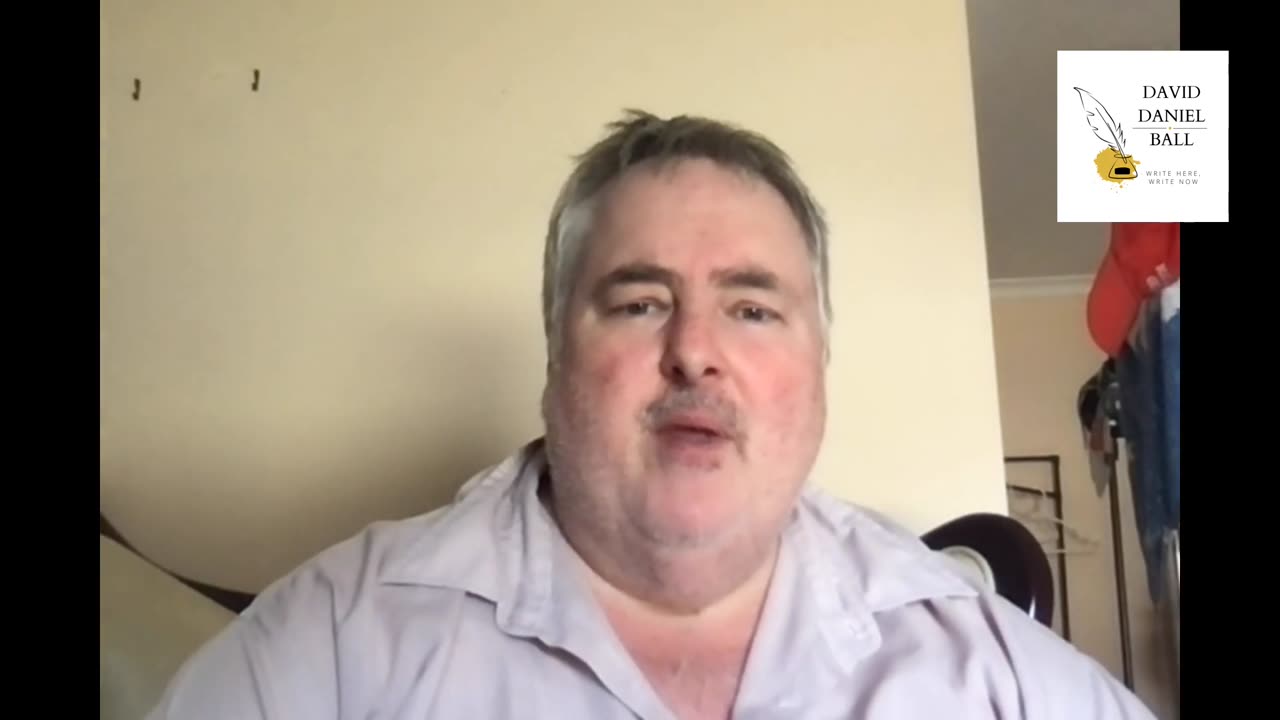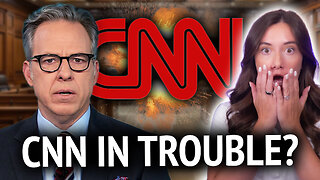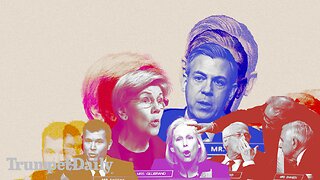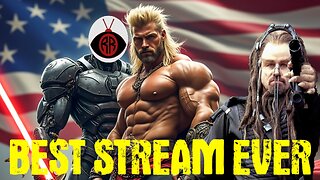Premium Only Content

Building Australia Freedom Tribute to populist podcasters 2
Barnes Brief on Australian Populism from Australia’s Untold Stories
This is a Freedom Edition tribute to my favourite podcasters, VivaFrei (Viva and Barns), America’s Untold Stories (Hunley and Groubert), The Duran, and Bongino. I started following them after 2016, when I was dissatisfied with political analysis following the 2016 election. I wish it that my Freedom Volumes of Bread of Life have introductions inspired by these podcasts. So consider these to be in the style of AUS’s cousins, Skip Hunley and Koala Groubert.
The first volume of Freedom will cover Prehistory to Australia’s Federation. Jan to Apr The second volume will cover Federation to Ming the Merciless. May to Aug The third volume will cover the times from Ming the Merciless to present day 2024. Sep to Dec
In depth
The legendary US Deep State exploits are echoed in Australia, as was the journalism divide favouring left wing liberals. NZ had been invited to join the union, but her history and peoples were different. Her Aborigines were Pacific Islanders with an advanced sea faring culture, her colonists were of more Scottish extraction to Australia’s Irish.
A popular conservative politician, George Reid (1845-1919), who was Australia’s fourth PM and later Australia’s High Commissioner to the UK, was faced with a press who attacked him, not his policies. George was very fat. A journalist asked him what he would name his child.
"If it is a girl, I will name her for the Queen. If it is a boy, I will name him after myself. But if, as I believe, it is no more than piss and wind, I will name it after you"
Early Australian political parties took on the UK divide, but the Australian conservatives, dominant, were fractured between Free Trade and Protectionist tariffs. The Australian left wing party named itself after a conservative force, Labor.
Culturally, Australia had European mores. A world class musician, Jacques Jacobs who was conductor of the London Steak house orchestra Trocadero, toured Australia in 1903 and played Sydney, Melbourne and Adelaide. Australia developed writers and poets. Breaker Morant was executed by the British during the Boer War for following British orders. Other poets include Banjo Patterson, Henry Lawson, Judith Wright, Les Murray, Dorothea Mackellar, Bruce Dawe and CJ Dennis.
Aboriginal relations was an issue, as a cargo culture developed and imploded. Churches stepped up to deal with the loss of cultural identity. Education extended on British lines with Bootstrapping from the Lancastrian schools and Madras schools being divided between British foreign office and Catholic church. Disputes between the two systems resulted in modern education as it is today, but also the systems took from each other, and became like. Former Dean of Education at Sydney University, Dr Cliff Turney, noted that the main difference between schools built along either line differed only by how windows were secured. Classrooms all had a raised dais, blackboards and sloped seating facing the blackboards. But, the windows might be very high, with window locks at the bottom, or low, with window locks at the top. What had happened was parents would come to schools during class and encourage their child to climb out the window and go home to work. The locks were positioned to prevent students opening the windows during class time. Coincidentally, British schooling established school summer holidays so children could help with the harvest.
FJ Gladman was raised under the new education system in London, and came to Australia as Inspector General of Education in Victoria. Upon retiring, he wrote “Control and Teaching (1876)” which had lesson plans and timetables for all classes and schools. New teachers were given a class, a copy of the book, and told to teach. A copy of the book was in former Sydney Boys Principal Rodgers, who had been the longest serving Principal in the school’s history by the 1970’s.
With Labor dominating through division, the ‘conservative’ parties merged and called themselves ‘Liberal.’ Over time, the Australian landscape has become conservatives (Liberal) and socialist (Labor), with Greens dragging the Labor party left, and Nationals, representing farming interests, tying the Liberals to the centre, which media describe as ‘extreme right.’
During WW1, when the US conservatives fractured, and Democrats under Wilson, opposed fighting the war until after election, Australian Labor Party figures copied Democrats. Australia was fighting from the beginning, but garnered support by opposing the war, and then, when elected, pivoted. The issue was conscription, and the Labor leader, Billy Hughes had a referendum on the issue in 1916. It was narrowly defeated, and in 1917 passed. However, in getting the bill passed, Hughes fractured the Labor Party, and took his elements into a Nationalist party from the merged Liberal party. Australian resistance to conscription was not opposition to the war, but opposition to the idea that Australians wouldn’t volunteer.
In fighting overseas, an ANZAC corp (Australia and NZ) with a UK force, attacked Gallipolli against Turkey. It had been Winston Churchill’s grand plan to open up Europe from the western front stale mate. It was nearly successful, but relentless press opposition, including Australian Journalist newspaper owner, Murdoch (dad of Rupert), derailed the expedition before success. So that, as ANZAC’s withdrew, there were no fatalities, as the Turks had nearly run out of munitions.
WW1 had resulted in Australia becoming a protectorate of Papua New Guinea.
Lutheran Reverend Karl Strehlow was assigned a parish in central Australia during the late nineteenth century. He came with his wife and had a son. While there, Strehlow became the go to guy for all peoples, for births, deaths and marriages. His respect was legendary, when two warring Aboriginal tribes faced off each other, Karl stood in the center and ordered them to stand down. And they did. When some cattle was stolen, settlers blamed Aboriginals and began randomly shooting them. Strehlow spoke to the police to stop it, and the police did. Much has been made of hate killings and racism in Australia, including a so called ‘Stolen Generation’ but there is no evidence of institutionalised bureaucracy being racist, and no evidence of a stolen generation. Journalist Andrew Bolt has had for the last twenty years an open challenge for the identities ten peoples deemed to be stolen. His challenge remains unmet. Most claims to being part of a stolen generation seem tragic cases of community dislocation where the church has stepped up to care for the lost. Also authorities have a vested interest in claiming racism being historical. It differs, even, from the US where no political party in Australia ever benefited from racism as Democrats did in the US. Although xenophobic ALP would later be instrumental in Japan opposing the West after WW1 armistice agreements opposed a “yellow Perile” as ALP (Labor) supporters viewed them.
Later in his life, Strehlow diagnosed himself with heart disease. He could get treatment in Adelaide, but his swelling made it too challenging to take the journey by cart. He needed a car. Authorities refused his request and so the entire community packed and journeyed with Strehlow’s family to Adelaide by cart. Strehlow died partway through the journey, at Horseshoe Bend, and his 14 year old son would grow up to be an anthropologist and write a biographical story “Journey to Horseshoe Bend.”
ALP would never, historically, have approved lynching of Aboriginal peoples, but they were racist in other ways. The White Australia Policy was begun by them and ended by their opposition. In much the same way Democrats supported slavery in the Civil War and opposed GOP attempts to dismantle it.
A conservative, Menzies could not get a fair go in the press with reporting, even after becoming PM. Australia created an unbiased Australian Broadcasting Corporation ABC, but they hired journalists who worked to policy. Even when WW2 ended, a lone Japanese soldier on a deserted island, with a radio for outside contact which only connected to the ABC, kept fighting until the 1970’s. He hadn’t known the war was over.
World War 2 began with Australia having a conservative PM, Menzies, sharing power under a government of unity. Just like the UK, the Labor party undermined the war effort through a mixture of labour union strikes and collusion with the press. Menzies had been in Europe and ANZAC’s fought at Tobruk (desert rats) and Jacob’s Well with distinction. A new Labor government had those troops withdrawn and stranded them in Singapore. Japan advancing through PNG and Australia’s forces were comprised mainly of newly trained 18 and 19 yo troops. MacArthur provided a steady hand and coordinated a war effort from Australia. PNG troops had been supported by native PNG peoples because they weren’t racist, as Japanese had been.
At wars end it was decided that not everyone who fought for the axis should face recriminations. The Thai authors of the Burma Railway were never held to account for their atrocities. Labor government delayed liberating POWs. Australia remained under food restrictions as farmers were off fighting. But government control increased and there was a bureaucratic attempt by ALP to nationalise the Commonwealth Bank. Control of banks were a longtime dream of the ALP, NSW Premier during the building of the Sydney Harbour bridge had tried to withdraw all the gold in the banks so UK would not be paid for their loan. A harbour bridge toll, intended to pay the loan, still exists 90 years after the bridge was opened, and five decades after the loan was paid off.
Such lawlessness was not rewarded by Australian voters, and Menzies again became PM from 1949 until he left office in mid 60’s. Menzies lowered regulation, expanding the economy, brought in civil rights, ended the White Australia Policy and prevented the exclusion of Aboriginal Peoples from an apartheid like existence. The ALP would revise history to claim their people did things, but they basically postured on issues.
-
 2:58
2:58
Current Affairs and world politics
16 hours agoHeadlines Jan 16 2025
92 -
 7:35
7:35
Tactical Advisor
1 day agoNEW Springfield Prodigy Compact (FIRST LOOK)
67.8K7 -
 16:45
16:45
IsaacButterfield
1 day ago $6.28 earnedWoke TikToks Are DESTROYING The World
37.1K31 -
 1:09:27
1:09:27
State of the Second Podcast
18 hours agoThis is Why We Don’t Trust Politicians (ft. @stones2ndsense)
31.2K4 -
 10:19
10:19
Chrissy Clark
14 hours agoCNN’s BILLION Dollar Defamation Trial
34.2K11 -
 1:00:27
1:00:27
Trumpet Daily
22 hours ago $6.26 earnedCongress Humiliates Itself - Trumpet Daily | Jan. 15, 2025
36.4K15 -
 1:49:46
1:49:46
Glenn Greenwald
1 day agoTrump Fosters A Peace Deal With Israel & Gaza; Trump's Pressure On Israel Embarrasses His Enemies & Provides Foreign Policy Clues; Rubio & Hegseth On War And Militarism | SYSTEM UPDATE #389
149K203 -
 1:28:46
1:28:46
Donald Trump Jr.
21 hours agoOut of this World: Breaking News Investigation on Secret Alien Aircrafts, Live with Ross Coulthart & Lue Elizondo | TRIGGERED Ep.207
353K505 -
 1:39:31
1:39:31
Space Ice
17 hours agoSpace Ice & Redeye: Battlefield Earth & Rob Schneider
96.2K7 -
 1:33:38
1:33:38
Flyover Conservatives
1 day agoAMANDA GRACE | Prophetic Warnings Ignored: What Happens When Leaders Defy God | FOC Show
81.1K49